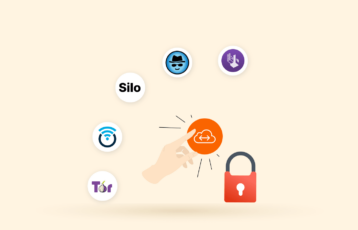Today, many websites are available; however, not all are secure to access. Yet, there is a digital process of securing a website known as Secure Socket Layer (SSL) certification.
This article explains what an SSL certificate is and why you should care about that extra “S” in your favorite site’s URL. We’ll also cover different SLL certificate types and installing an SSL certificate on your website to protect your readers, precisely as Privacy Savvy does.
What is an SSL certificate?
It is a digital certification installed on website servers that verifies a website’s identity and encrypts users’ data (sensitive information) from being stolen by hackers and identity thieves.
The certificate gives assurance on the legitimacy of a website. It ensures user privacy and reduces the risk of third-party involvement in Internet communication/ transactions. A valid SSL certificate must include;
- Name of the person obtaining the certificate
- Serial number and expiration date of the certificate
- Copy of the certificate owners public key
- A digital signature of web owner on certificate
Even without seeing a certificate, if a website has a green padlock in its address bar, it’s SSL certified.
The URL will also include an HTTPS:// and secure will also be on the address bar to further assure you, although it depends on the type of browser used.
How SSL certificate works
The certificate works on the principle of connecting and triggering.
The principle means that after installing the SSL certificate on a site, a browser’s connection triggers the SSL to action where information encryption occurs. That means it can’t function if a browser and a server don’t interact.
The SSL works as coverage for transmission protocol as it provides a high layer to protect transmission while an encrypted connection occurs.
In other words, SSL serves as an internet filter that prevents the accessibility and readability of hackers as well as identity thieves.
Which means they (hackers) cannot read your information transmitted but can only see the sites you’re connected to. This coverage makes surfing your favorite website convenient and safe.
Private information, such as credit or debit card information, is well concealed. This benefit is the primary reason why sales sites require SSL certification.
SSL certificates are on websites and blogs and are required for
This means all your personal information on social sites that are SSL-certified is protected.
Social network sites such as Facebook, WeChat, Twitter, Instagram, etc. use high-level encryption algorithms to protect data shared on their platforms either via private chats, forums, or group conversations.
SSL encryption also protects files shared on sites and webmail servers. SSL certificate makes use of two-way encryption, server encryption, and browser decryption for transmission. The decryption is unique to the browser as they randomly generate codes that can only be decrypted by itself.
For additional security, subscribing to a VPN service can help provide stealthy encryption of online activities, including your internet connection. Third parties are locked out as they not only have no access to your information but can also not monitor any websites you visit.
Check out our list of top VPN recommendations here.
A VPN also helps protect your information from being hijacked on a public server, e.g., public hotspots.
Is this necessary?
Yes. Extremely. The existence of ‘s’ or padlock is vital to the security of information exchanged while using a particular website. As a web owner or user, if you cannot ascertain the safety of the website you own or are surfing, you’re at high risk.
But no need to panic.
This article will outline ways of transitioning from an HTTP website owner to an HTTPS website one. We’ll also be sharing useful tips on protecting yourself as a user if your favorite website is unprotected.
We will also be sharing tips on how to know if the site is certified at a glance. Remember, your security is very vital.
Price of an SSL certificate
Its prices range from free to hundreds of dollars. The price of an SSL certificate depends on your certificate provider. Other factors such as the type of certification you’re purchasing also determine the price.
Cheaper certificates usually offer the same level of security as expensive or branded SSL certificates. If you own a simple blog or website, a cheaper certificate is ideal.
For large eCommerce websites, costly and branded SSL certificates are most suitable because renowned SSL certificate issuing companies have impressive records of keeping their clients’ projects safe.
Although there is little difference in security between a free SSL certificate and a paid one, the level of validation and warranty varies. Most free SSL certificates only cover domain validation and usually have no warranty, while paid SSL certificates cover everything.
Is having an SSL certificate mandatory today?
It is not obligatory, but to improve your odds, you should consider purchasing an SSL certificate.
Although having an SSL certificate is vital for a website owner, it greatly depends on the type of website involved. Your budget matters, too. Also, your plans for the portal as a web owner like if your site would keep being a mini-site or you would eventually advance) can equally be a factor to consider.
While in the past, if your website didn’t collect sensitive data such as social security numbers or credit cards, you could be fine without an SSL certificate.
However, since every major browser today has notifications for non-HTTPS sites, it is now critical to ensure that your website has an SSL certificate installed. If it does not load via HTTPS, you risk losing too many visitors, who are more likely to back off after their browsers send them a notification about the site being insecure.
Let us explore some instances where you may or may not need to have an SSL certificate:
Is your website a membership site?
Do you offer free or paid site membership that needs users to input login information, financial information, e.g., credit or debit card information and bank account?
Or are personal information such as home addresses, date of birth, etc., required?
If your site requires any of this type of documentation, you certainly need an SSL certificate installed on your website. That will keep your subscribers’ information encrypted and enable active participation on-site without fear of privacy invasion.
Is your website a sales site?
Do you sell digital materials? Or do you run an online shop that would require users to make transactions with their debit or credit cards? If so, the certificate is of extreme importance to you.
No one would want to reveal his or her account information on an insecure platform.
If even a single client’s private information gets hacked from your site, it may negatively affect your whole e-commerce business. That can result in short-term damage and a long term one. In the past, companies have also been forced to shut down after being hacked.
Some would argue an SSL certificate is not required for all the site pages but it undoubtedly is crucial for pages like store and checkout. And of course, complete site security would boost more patronage and trust from customers.
Is your website a simple blog or a mini-website about Guffey stuff?
An SSL certificate is not required for a simple blog site with no membership or purchase needs. This is because there is no exchange of information between the site and users. But again, if you ever consider making money from your blog through sales, it’s vital to obtain a certification.
Benefits of installing an SSL certificate on your site
Security
People are getting privacy-conscious today. Out of 100 internet users, at least 80 checkout for site security when surfing the internet. Due to the increasing rates of cybercrimes, no one wants an invasion of privacy. You wouldn’t want your website to be reported or brought down, would you?
A site without adequate security is like a house without a roof. No matter how beautifully painted the house is, no one would want to live in it. That is precisely how clients react to sites with no security.
Potential boost in SEO ranking
Website security has become one of the factors contributing to a boost in Google rankings in recent times. (Although it would only be a minimal boost compared to other google rank boosters.)
The good news is, this applies to all sites. Whether your website has a login page, store page, or any data collection page doesn’t matter. If you install the certificate on it, you will be entitled to SEO benefits quickly.
It can help you get a boost without having to go through the huddle of building heaps of backlinks and producing tons of content.
Future growth purposes
Yes, you might have a simple blog right now. But in a few years, you may decide to expand to e-commerce, tutoring, eLearning, fitness sites, etc. Having an SSL certificate now would aid in smooth transitioning.
A must in this era
In 2018, Google Chrome began flagging websites with zero user security, i.e., sites without SSL certification. That is not only for eCommerce sites or membership-based platforms but all websites on the internet.
The good thing is, if you are a website owner, it isn’t hard to get once you’re on the right track.
At this point, you may be considering getting an SSL certificate for your site. Before purchasing an SSL certificate, you need to consider a couple of things.
It’s essential to know the type of certification that suits your site, the type of verification required, and trusted places to buy SSL certificates. Let’s get to them all—one by one.
Different types of SSL certificates
There is a wide range of certificates to pick from as a website owner: single-domain, multi-domain, wildcard, and multi-domain wildcard SSL certificates. We will guide you a little guide on preferred SSL certificates to purchase based on the nature of your site below:
Single domain
This type of SSL certification is suitable for small businesses, blogs, or personal websites. It’s for the accreditation of one fully qualified domain name on a single certificate. For example, the available domain SSL certificate’s security will only secure pages for www.sslexamplesite.com, making it suitable for small websites.
Multi-domain
As the name suggests, this type of SSL certificate allows the management of multiple domain names with a single certificate. It is suitable for larger websites or sites that provide services as in those cases a single certificate wouldn’t be enough to secure the website.
Larger sites have multiple domains to connect, e.g., their client portal, blog, etc.
It allows for the inclusion of numerous clients’ domains into a single certificate, making it easy for website owners to ensure the security of all their users. Tracking certificate expiration is also easy and saves costs compared to purchasing multiple SSL certificates.
Wild card
A wildcard certificate cuts the cost of securing multiple subdomains for larger sites. This type of certificate is suitable for membership portals, where subdomains such as logins, portals, etc., are required.
Obtaining a wild card makes it easy to maintain security. It’s very cost-effective for big corporations compared to purchasing lots of multiple domain SSL certificates and managing each of them.
It allows security no matter the number of servers used by the website, e.g., ‘www.sslexamplesite.com,’ ‘user.sslexamplesite.com,’ and ‘forum.sslexamplesite.com.’
Multi-domain Wildcard SSL certificate
This type of certificate is also a suitable option for large websites. It helps to manage the security of multiple subdomains and multiple domains under a single SSL certificate.
We also have a shared SSL certificate in addition to these four different SSL certificates. However, this certificate is widely available and free, so it is not recommendable.
Level of validation needed by your site
An SSL certificate has three validates:
Domain validation
This level covers primary verification and encryption of domain name registration. It’s cost-effective and effortless to purchase as it takes only a few minutes to buy.
It protects the portal with no ties to the owner of the site. It’s suitable for sites that don’t collect personal information, e.g., small blogs.
Organization validation
In this case, the personal information of the owner gets validated, unlike domain validation. It takes longer than the domain validation as it can take hours or days. It’s suitable for companies/web owners who require certification on budget.
Extended validation
Lots of security procedures are required to obtain this validation. With extended validation, all aspects of a site are validated and it can take you several weeks to have this validation. Here the insurance processes and criteria are followed according to the SSL certificate industry’s governing consortium.
Trusted SSL certificate providers
Currently, there are lots of sites that offer SSL certificates. Below we list a few that are safe to use:
GoDaddy
This web hosting provider has gradually dived into the SSL certificate field. GoDaddy has an impressive price structure and offers domain validation, organizational validation, and extended validation certificates at low prices.
The price structure is broken down based on site structure – single site, multiple-site, or domain with complete subdomain coverage.
GoDaddy is relatively cheap on the first installment but becomes more expensive on renewal.
To minimize cost, fresh installments each year are highly recommended.
The SSL Store
SSL store, which is available at thesslstrore.com, covers a lot of subsurface providers such as Comodo SSL and RapidSSL. This store dates as far back as 2009 and has been building quite a reputation.
A standard domain validations subscription is $14.95/per year.
Organizational validation is at $30.40, while the extended validation is at $59.99.
The main advantage of this provider is its ability to cut across various CAs all at once. It correspondingly has a partnership with reputable CAs in the world.
The SSL store is the most cost-effective SSL certificate provider and has a 30-day refund guarantee. So, If you purchase a certificate via it and encounter any issues due to providers’ error, you can get your money back.
Digicert
This SSL certificate provider makes use of critical public infrastructure after its acquisition of Norton’s website security in 2017. A simple SSL certificate starts from $208 per year. But you can get a significant discount with two years purchase.
Its wildcard SSL certificate covers multiple servers. Although Digicert is an attractive provider due to its wildcard subscription, it’s initial subscription isn’t cheap.
GeoTrust
GeoTrust cover SSL certificates, signing services, and the provision of SSL for enterprises.
The SSL certificate issued by GeoTrust is extensive as services range from domain level to extended level certification.
The prices of GeoTrust services are quite expensive because it’s targeted mainly at businesses and enterprises. The identity check/validation process takes longer than other providers as it requires thorough validation (again because of enterprise SSL solutions involved).
Entrust Datacard
Entrust is a US-based SSL certificate provider that has maintained a good reputation since 1994. It allows clients to manage a large number of domains across multiple certificates. Their primary product, Standard SSL, price starts from $199 per year. The wildcard SSL would cost you $699 for a year.
Network Solution
This hybrid service provider offers a wide variety of network solutions: domain names, e-commerce services, and SSL certificates.
Although SSL certificate services aren’t their main area, they offer cost-effective plans to attract clients. This network sometimes requires a lot of guidance to set up.
For a basic SSL subscription, you would need to pay $59.99 while the EV costs $399.5/year. Validation doesn’t take so much time but requires a few hours or five days at max sometimes.
These are the top six providers as per our research and tests. But our main focus in this article will be GoDaddy. Let’s discuss its details further.
GoDaddy as an SSL certificate provider
Ready to purchase your SSL certificate? You’re certainly on the right track. Here we do a little review on the number one recommended SSL certificate provider GoDaddy. We will also cover why GoDaddy SSL certificates are worth the purchase.
They are popularly known as a domain registrar with the highest and most mind-blowing fresher’s discount. However, GoDaddy also offers SSL certificates to help site owners make their websites secure.
With over 20 years of reputable service in the internet industry, GoDaddy is one of the fastest revolving internet service companies. Its impressive solutions, strong brand reputation, and SEO ranking boost benefits have made GoDaddy a highly recommendable and attractive choice.
Key benefits
- Provides supreme internet security with premium encryption and has packages suitable for personal blogs to corporate sites. They make use of PCI-DSS, GDPR, and other best practices to ensure stealthy security.
- They offer a significant boost in the SEO ranking of your site, which means that GoDaddy helps cut down all the stress attached to backlinking. Note: although there is a significant boost of SEO ranking with GoDaddy, backlinks are still necessary as the increase may not be significant.
- Very cost-effective with massive cash slash for first-timers. For small business owners willing to purchase SSL certificates, GoDaddy provides discounts on hand.
- Provides a secure medium for the encrypted web-based and mobile payments as it has got end-to-end cryptography deployed.
Highlighted features
- Padlock in the address bar
- Secures multiple servers and domains
- Has a safety seal display. That means anybody visiting your site would easily see your site as secure
- It has express customer/security support
- Has a massive Liability Protection budget.
- It makes use of SHA&2 & 2048 bit encryption.
- Has a 30 days risk-free Refund Policy.
- It is compatible with all modern browsers and mobile devices.
Price of GoDaddy SSL certificates
- Managed SSL services – £149.99 ($199) per year
- Wildcard SSL – £229.99 ($305) per year
- Basic domain validation – £63.99 ($83) per year
- Extended validation – £159.99 ($211) per year
Terms of SSL GoDaddy certificates
If you’re interested in using GoDaddy SSL certificate services, there are essential terms of services that are worth mentioning:
13 months life span
Quite shocking right?
The GoDaddy SSL certificate provider began this new 13-month certificate lifespan policy on 1st September 2020. Heartbreaking indeed.
For some reason, this policy has made this provider even more attractive.
This 13 months longevity significantly shows that GoDaddy is always on standby and continually evolving at an equal pace with the internet to keep your website protected.
SSL certificates with long renewal intervals are at high risk of a security bridge. In simple terms, long certificate renewal intervals result in less secure certifications.
Arguably, a short validity makes this website more attractive to clients. Tech-savvy visitors become more confident to trust your site as it would reduce concerns on the privacy bridge.
As a web user, a site with an SSL certificate having a validity of two to three years creates a feeling of insecurity. Mainly because as rapidly as new encryption protocols keep coming up, hackers learn to enhance their skills equally fast.
Periodic certification also shows seriousness on the part of site owners. Such SSL certificates allow for confirmation of the site owner. Which further boosts clients’ confidence as they are aware of the person behind the transaction.
But if you are already a user of the GoDaddy SSL certificate and you purchased your certificate before the 13 months lifespan policy became official, don’t panic. This new term won’t apply to you until your present certificate reaches the expiry date stated on the certificate.
Extended purchase
GoDaddy gives room for extended SSL certificate purchase. Extended purchase means that as a site owner, you can pay for a longer duration.
Meaning while GoDaddy doest not issue SSL certificates for longer than 13 months; still, it will reissue yours before the validity period expires if you had select longer term lengths.
How to Install SSL certificate after a successful purchase
We are finally at the best part. Getting an SSL certificate can be pretty exciting but its setup process might be a concerning thing for many.
Here, we will outline necessary steps to get your money working in no time.
First off, there are three significant things you need to take care of. Below you go with them:
- SSL certificate: Your provider must have already sent it to your email. If it hasn’t, there is no need to panic. Go to your account dashboard and download it onto your device.
- CA bundle: Usually, when downloading SSL certificates, they appear as zip files/folders. If you unlock this zip folder, there are other sub-documents inside known as intermediates. Sometimes not all SSL certificates come with intermediates. If yours doesn’t, make sure to download the suitable bundle for your certification.
- Private key: You may have noticed it. But if you haven’t, don’t be bothered. Your server can automatically track it.
Installation instructions
While the SSL installation process can differ a bit from one hosting provider to another, below you go with general steps that most of them involve:
- Sign in to your website hosting provider.
- Click on SSL or TLS (another name for SSL).
- Locate the box ‘install an SSL certificate on a domain‘ and click on it.
- Fill in your domain on the domain field on the next page. Note: the domain name filled here is the one you want to link to your SSL certificate.
- Copy and paste your Certificate file on the provided box and fill all other appropriate spaces available; certificate, private key, and certificate authority bundle.
- Once all fields are correctly filled, click on install. Ensure not to enable SNI (server name indicator) for mail service. That is because SNI is suitable for multiple hostnames with the same IP address.
- If your certificate doesn’t reflect immediately, refresh your website URL, and it should work. If the problem remains, you might need to clear your browser cache.
- That is it. Your SSL certificate is installed, and your transition from HTTP to HTTPS has officially been completed.
Note: For multiple servers, you would have to install certificates repeatedly to each server.
Visit your site and check out your new modifications to ensure the proper functioning of HTTPS/SSL.
How to protect yourself if your frequently visited site has no SSL certificate installed
All the major sites today are SSL certified, but if your favorite portal isn’t, there is a way around it.
First of all, as a web user, if a site isn’t certified, never, we emphasize, NEVER purchase anything from that site or disclose your personal or business data no matter the situation. Remember, non-encrypted messages are exchanged at maximum risk.
In the case where you want to see a site’s status turning to be secure, you need to email their admin team or anyone you feel can configure the site. Let them understand the importance of making their site SSL-protected because most website owners still have no idea about it.
On the other hand, if you still can’t help continually visiting the site, get yourself a VPN. A VPN aids with the encryption of information transmitted across a browser. If a site isn’t encrypted, this tool could be a great help and a must-have for you.
The most important lesson from this article is to understand why SSL certificates are of so much importance and how to protect yourself as a web user/owner.
As an easy fix to your digital security, ensure you only visit websites that are SSL certified. It would also help if you would better limit the amount of personal information you give out on forums.
If you are a business owner, know that your site’s security status doesn’t only matter to you and your site visitors but search engines like Google too.






